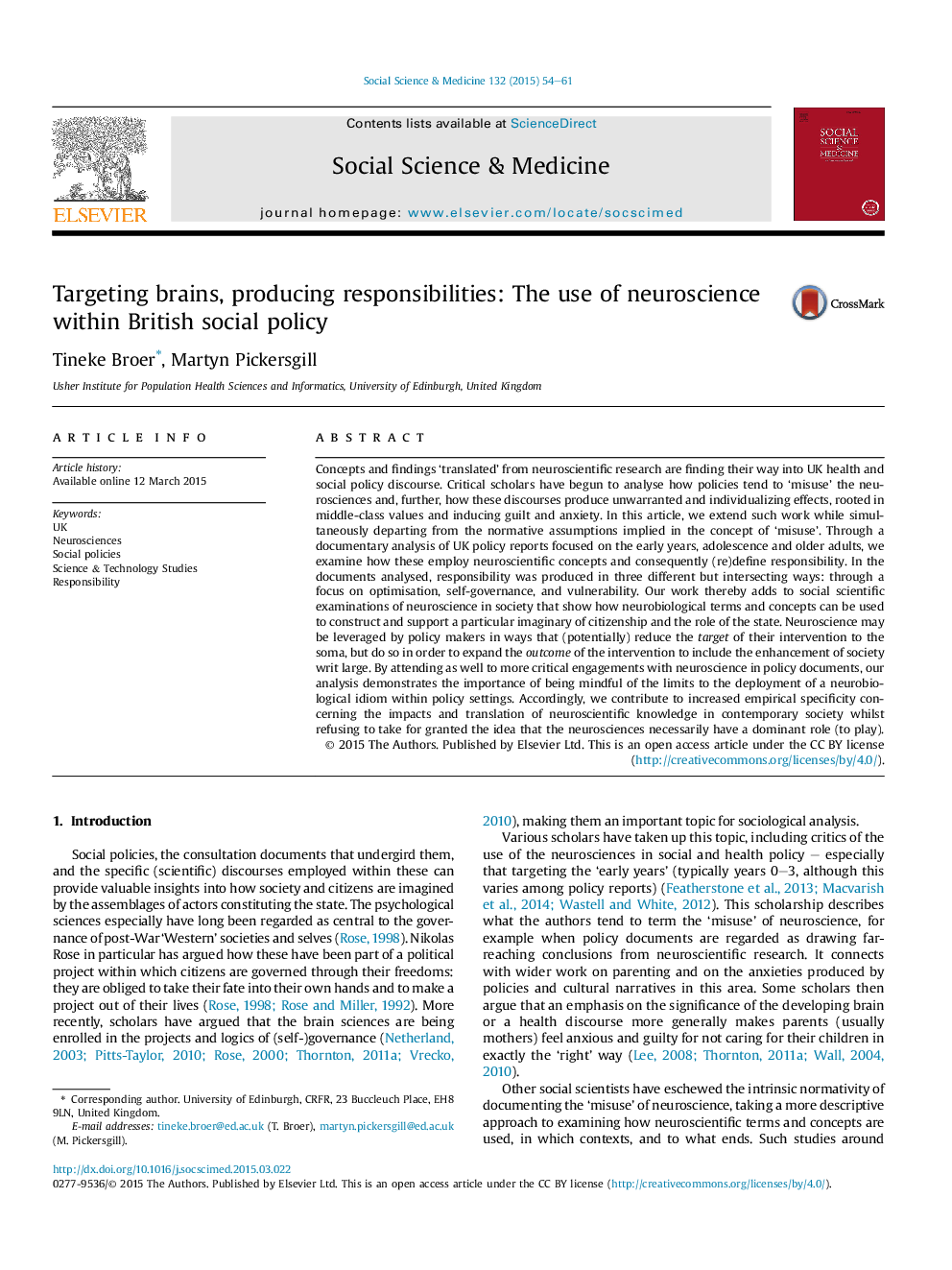| کد مقاله | کد نشریه | سال انتشار | مقاله انگلیسی | نسخه تمام متن |
|---|---|---|---|---|
| 7332688 | 1476036 | 2015 | 8 صفحه PDF | دانلود رایگان |
عنوان انگلیسی مقاله ISI
Targeting brains, producing responsibilities: The use of neuroscience within British social policy
ترجمه فارسی عنوان
هدفگیری مغز، مسئولیت تولید: استفاده از علوم اعصاب در سیاست اجتماعی بریتانیا
دانلود مقاله + سفارش ترجمه
دانلود مقاله ISI انگلیسی
رایگان برای ایرانیان
کلمات کلیدی
انگلستان، علوم اعصاب، سیاست های اجتماعی، علوم و فناوری مطالعات، مسئولیت،
ترجمه چکیده
مفاهیم و یافته های "ترجمه شده" از تحقیقات علوم اعصاب در حال یافتن راه خود را به گفتمان بهداشت و اجتماعی در بریتانیا است. محققان انتقادی شروع به تجزیه و تحلیل این موضوع کرده اند که چگونه سیاست ها به "سوء استفاده" علوم اعصاب و همچنین این که چگونه این گفتمان ها اثرات نامحسوس و فردیت دارند، ریشه در ارزش های طبقه متوسط و ایجاد گناه و اضطراب دارند. در این مقاله، ما چنین کارهایی را گسترش می دهیم در حالیکه به طور همزمان از مفروضات هنجاری که در مفهوم «سوء استفاده» اشاره می شود، رد می شود. از طریق تجزیه و تحلیل مستندات گزارش های سیاست انگلستان در سال های اولیه، نوجوانان و افراد مسن متمرکز شده است، ما بررسی می کنیم که چگونه این مفاهیم را به کار می گیرند و در نتیجه (تعریف) مسئولیت را تعریف می کنند. در اسناد تجزیه و تحلیل شده، مسئولیت در سه روش متفاوت اما متقابل ایجاد شده است: از طریق تمرکز بر بهینه سازی، خودمراقبتی، و آسیب پذیری. کار ما این است که به بررسی علمی علوم علمی در علوم اعصاب در جامعه افزوده می شود که نشان می دهد چگونه مفاهیم و مفاهیم نوروبیولوژیکی برای ساخت و حمایت از خیالی خاص شهروندی و نقش دولت استفاده می شود. علوم اعصاب ممکن است توسط سیاست گذاران به وسیلهی راههایی که (به طور بالقوه) اهداف مداخله آنها را به سمع کاهش می دهد، افزایش دهد، اما این کار را برای به دست آوردن نتیجه مداخله به منظور افزایش رفاه جامعه ضروری می کند. با در نظر گرفتن اهمیت بیشتر در ارتباط با علوم اعصاب در اسناد سیاست، تجزیه و تحلیل ما اهمیت توجه به محدودیت های استفاده از اصطلاح عصبی را در تنظیمات سیاست نشان می دهد. بر این اساس، ما در افزایش ویژگی تجربی در مورد اثرات و ترجمه دانش دانش نورولوژیک در جامعه معاصر کمک می کنیم، در حالی که امتناع می کند که اندیشمندان علوم اعصاب الزاما نقش مهمی داشته باشند (برای بازی).
موضوعات مرتبط
علوم پزشکی و سلامت
پزشکی و دندانپزشکی
سیاست های بهداشت و سلامت عمومی
چکیده انگلیسی
Concepts and findings 'translated' from neuroscientific research are finding their way into UK health and social policy discourse. Critical scholars have begun to analyse how policies tend to 'misuse' the neurosciences and, further, how these discourses produce unwarranted and individualizing effects, rooted in middle-class values and inducing guilt and anxiety. In this article, we extend such work while simultaneously departing from the normative assumptions implied in the concept of 'misuse'. Through a documentary analysis of UK policy reports focused on the early years, adolescence and older adults, we examine how these employ neuroscientific concepts and consequently (re)define responsibility. In the documents analysed, responsibility was produced in three different but intersecting ways: through a focus on optimisation, self-governance, and vulnerability. Our work thereby adds to social scientific examinations of neuroscience in society that show how neurobiological terms and concepts can be used to construct and support a particular imaginary of citizenship and the role of the state. Neuroscience may be leveraged by policy makers in ways that (potentially) reduce the target of their intervention to the soma, but do so in order to expand the outcome of the intervention to include the enhancement of society writ large. By attending as well to more critical engagements with neuroscience in policy documents, our analysis demonstrates the importance of being mindful of the limits to the deployment of a neurobiological idiom within policy settings. Accordingly, we contribute to increased empirical specificity concerning the impacts and translation of neuroscientific knowledge in contemporary society whilst refusing to take for granted the idea that the neurosciences necessarily have a dominant role (to play).
ناشر
Database: Elsevier - ScienceDirect (ساینس دایرکت)
Journal: Social Science & Medicine - Volume 132, May 2015, Pages 54-61
Journal: Social Science & Medicine - Volume 132, May 2015, Pages 54-61
نویسندگان
Tineke Broer, Martyn Pickersgill,
